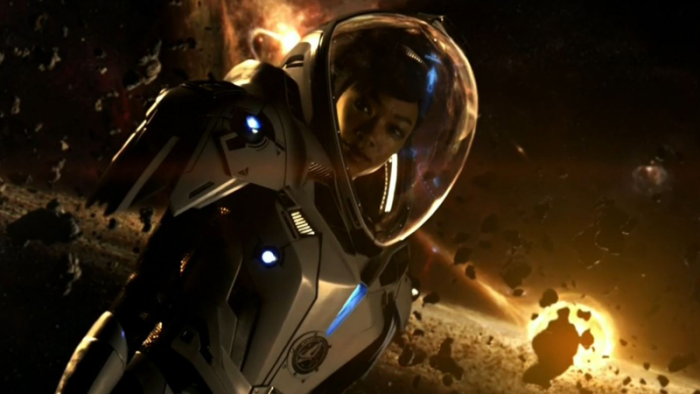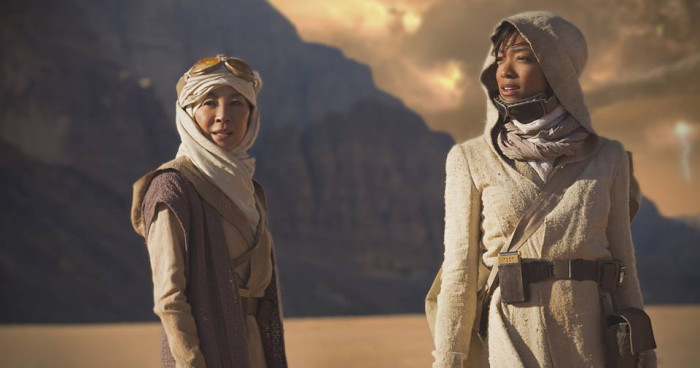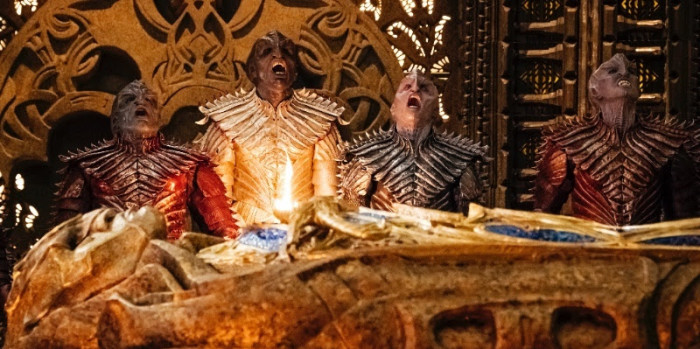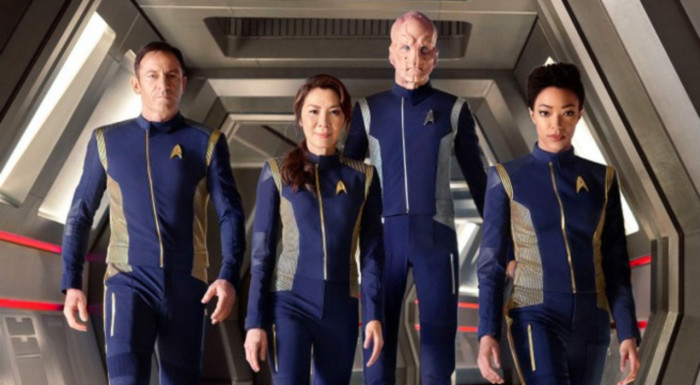'Star Trek: Discovery' Review: A Longtime 'Trek' Fan Takes On (And Mostly Approves Of) The New Series
(We are running two reviews of Star Trek: Discovery – one from an old school Star Trek fan and one with less experience in this iconic universe. Here is the first of the two reviews.)Star Trek: Discovery has brought the historic Gene Roddenberry property back to the network that started it all for the U.S.S. Enterprise. Thankfully for CBS and many Star Trek fans, Star Trek: Discovery doesn't disappoint. In fact, it stands up to the original and the movies while retaining the classic Star Trek cerebral nature.
Perhaps this intro reads more Vulcan than I would like it; speaking in standard human terms, Star Trek: Discovery is fun, exciting, and provides us with one of the most interesting protagonists we've seen in a while. It's not without its issues, though, which we'll get to soon enough.
If you've seen the first two episodes, keep reading; if you're afraid of spoilers, you'd better bounce now.
The Old and New Collide
I've been a Star Trek fan ever since I was a little kid, thanks to watching Star Trek: The Next Generation with my dad. What I've always loved about Star Trek, regardless of which series you talk about, is how much focus there is on making being smart cool. There's an almost OCD-level focus on procedure, protocol, tactics, and science, which is mentally comforting (especially if you're an OCD sufferer like me) and inspiring for people, especially kids who might be able to see themselves in Starfleet's iconic characters such as James Kirk and Jean-Luc Picard, whose ultimate pleasures in life came from fulfilling their duty and protecting their crew.
That focus on paramilitary, scientific protocol is very much a part of Star Trek: Discovery. The importance of Starfleet's mission and their prime objective — to aid those in need and increase the Federation's knowledge of new worlds and cultures — is paramount in every fiber of the characters in this new series and reflects Roddenberry's personal mission to imbue his viewers with a desire to have greater understanding of America's people and cultures, a mission that is still striving to be realized today.
The altruistic throughline of Star Trek is something that has been lost over the years, especially in the Star Trek movies of the '90s and early '00s. The Star Trek reboot brought much of Roddenberry's mission back to the forefront, but some could argue that it's in danger of being lost yet again through the sequels, particularly Star Trek Into Darkness, which had Spock fighting Khan on a flying vessel, a scene not too dissimilar from the ridiculous fight scene between Anakin and an assassin hired to kill Padme in Star Wars: Attack of the Clones. But Star Trek: Discovery retains that focus on Starfleet's mission as well as Roddenberry's dream of people working as a unit, furthering their understanding of the universe and of each other.
What's great is that Star Trek: Discovery has been able to combine the procedural elements of Star Trek's TV incarnations with some of the action from the franchise's films. We get a ton of action — explosions, space skirmishes, phasers set to stun and even a Vulcan neck pinch (delivered from our human protagonist no less, proving that a human can, indeed, learn something believed to be only picked up by Vulcans). The marriage of the brain and the heart comes from the fact that the action isn't propelled by more action — the action propelled by logic. Take for instance probably one of the more tense scenes in the second episode, which features our heroine Michael Burnham (Sonequa Martin-Green) about the die in a compromised brig unless she can get the computer to comply to her request to escape. The tension is, of course, that this is a life-or-death moment, but the action actually isn't Burnham's eventual escape — it's how she talks the computer into and out of a logic puzzle to make the computer comply. All she does is stand there and ask the computer questions, but that, my friends, is the action, and even with her just standing, it still provided the same amount of adrenaline comparable to any Klingon attack.
To go back to the topic of Star Trek characters as role models, Star Trek: Discovery continues Roddenberry's other mission, which is to showcase and address America's current racial and cultural issues and quagmires in an inquisitive and respectful way. To that end, characters like Spock, Uhura, Sulu and Chekov have special prominence, and later Star Trek series characters such as Geordi La Forge, Keiko O'Brien, Tuvok, Harry Kim, Benjamin Sisko, transporter inventor Emory Erickson, and several others continued Roddenberry's vision of a united America. (It can certainly be argued that other cultures and ethnicities are showcased more than others, but it's not like Roddenberry's vision, much like the country, can't evolve into something more unifying and more perfect).
I know I certainly saw myself in the more logical characters like Spock and Uhura, who also acted as racial and cultural role models for me — being someone who is both a black woman and someone who has had to come to terms with various cultural stereotypes, Spock and Uhura provided (and still provide) a reminder that you can be "weird" and still be successful, probably even more so than those who stay within the lines. You can be who you are and use your gifts and even what you perceive to be your faults to your advantage to make the most of your life and your purpose.
That focus is definitely alive in Burnham, who is probably the closest version of me I've seen in a Star Trek property. She's a human who grew up on Vulcan, with Sarek (yes, Spock's father) as her foster father. She is a character who keeps her cultural and racial (in this case, "racial" is referring to her being human) conflicts simmering just beneath the surface. It seems like she's currently working on coming into her own, similar to how Spock had to come into his own in the Star Trek reboot. But, it's clear that she is slowly learning how to combine her human qualities and Vulcan upbringing to make her a viable, indispensable member of the Federation.
For folks like me, not just black women, but people who have felt on the outskirts in many different ways, Burnham shows that you can feel like you're at the bottom rung in nearly every way, but there's always something unique that only you can bring to the world. In short, characters like Burnham, Spock, Uhura and the rest show that you matter, not only to yourself, your community and your world, but to the entire cosmos. The fate of the Federation, as it were, depends on all of us, and to paraphrase a certain neighborhood Spider-Man's uncle, that means we all have great responsibility. But that also means that we all have great power, and it's up to us to discover it.
Women of the Future
Speaking of Burnham, she is one of two women at the helm of a Federation ship. The captain of the U.S.S. Shenzhou is Phillipa Georgiou, played by Michelle Yeoh. Having Georgiou at the helm with Burnham as her Number One starts a new tradition of having women of color in high-ranking leadership positions within the Star Trek franchise.
Don't read this as me discounting Uhura as a ranking officer. But I'm talking about the captain's chair. The highest seat you can hold on a Federation ship.
Women in general have been held back from higher positions in many arenas in real life, but women of color have been held back moreso. If we're using Star Trek as an example, the most prominent women of color in a position on the bridge was Uhura. But even with her expertise, we've never seen her or other prominent women of color command a ship from the captain's seat. It's been a dream deferred, but finally, that dream is a reality.
Seeing Georgiou and Burnham take on the Klingons is something that's inspiring to behold. To see women, particularly women from marginalized backgrounds, be treated with respect and deference — and with no one bringing up any antiquated ideas about women in leadership positions — provides a template for America to follow, if they choose to do so. Women of color should be given the same opportunities and chances as anyone else — they are more than capable to handle the pressures any job can throw at them.
If there's one negative, it's the fact that Georgiou dies in the second episode. On the one hand, this provides Burnham's story with more emotional weight since Burnham probably feels like Georgiou's death is her fault. However, for Asian viewers, Georgiou's death might feel like a setback. I write this because a black woman's death on TV often feels like a setback for black female characters as a whole.
Take for instance Into the Badlands, one of the most inclusive shows on TV. Even with the show's "wokeness," as it were, to the issues that can occur with stereotypical portrayals, the series still committed the crime of killing a prominent black female character — Veil, Sunny's wife-to-be and mother of his child — solely to propel Sunny's emotional arc as the show heads into its third season. Many black female viewers were heated about this, since it seemed like Veil sacrificed herself even though her safety was literally steps away. Her death was even more hurtful since it came after having her tortured for the whole season.
It's not so much the act of killing a character that's upsetting — if a character has to die for the story, then that's something to take into account. But killing a character that represents an underserved market is something that always has to be taken seriously. From my own talk with Into the Badlands EP Al Gough, I learned that Veil's death was heavily discussed and argued over in the writer's room. But what might have not been taken into the account was the fact that Veil was the only woman of color in a prominent position on the show. Killing her has now left a huge void in a show that has been buoyed in part by viewers who are, in fact, women of color. A similar outrage might happen with Georgiou's death. She might be one two women of color in this first two episodes, but she's also the only woman of Asian descent in a prominent role on this show. Killing her in just the second episode might ring as a slap in the face to Asian viewers, particularly Asian women. Again, like Into the Badlands, I don't think Star Trek: Discovery means any harm. However, Georgiou's death is something that is bound to send shockwaves throughout a community that has already fought against whitewashing in a big way in recent years, especially in 2017.
The Klingons
Another area I have a problem with when it comes to Star Trek: Discovery is that it goes back to the well of the often-treaded storyline of warring Klingons. I feel like we should be past this storyline, seeing how one of my favorite Star Trek: The Next Generation characters, Worf, gave us a different side to the Klingons and, in fact, showed us that they aren't all a monolithic group of people.
Granted, Star Trek: Discovery is set 10 years before the original series, but still, do Klingons have to be portrayed in this staid, one-note fashion? Technically, if you're going by Memory-Alpha, the tense relations between the Klingons and the Federation are about right for the time period Star Trek: Discovery takes place in. However, the depiction of Klingons as war-hungry is what's being presented to us in Star Trek: Discovery as the Klingons' defining trait. It's a little paint-by-numbers to me, especially when you compare this presentation to Worf, one of the most well-rounded characters in the Star Trek pantheon, and the overall complex character treatment of Klingons in various Star Trek series.
To go even further, several Star Trek fans feel like the focus on war in general is a little out of pocket, since Star Trek's original goal, as mentioned above, is peace. The focus on war instead of a five-year mission is something that will affect each Star Trek fan differently. For me personally, it seems like war is being used as a vehicle for character study, and if it's used in that sense, then some cool things can happen, especially since it still seems like the greater overall message the show wants to posit is that peace and understanding should trump war (as shown in Georgiou's attempts at diplomacy with the Klingons). But it'll be clearer if that's the case if the Klingons are investigated more thoroughly throughout the course of the season.
To be fair, there is something interesting happening with the main Klingon of note, T'Kuvma (Chris Obi), who seems like something of an outcast in flashbacks of his childhood. It's these flashbacks that show us how being ostracized helped him gain a devoted following of likeminded outcasts who wanted a place to belong. It also shows how his desire to define what it means to be Klingon comes from his own insecurities and anger at the status quo. But that anger has also turned him into a zealot who, much like our current leadership, stokes the fires of nativism to gain power.
Another interesting moment involves Voq, Son of None. He's a white Klingon, an outcast solely because of his skin color. This, of course, has ties to today's racial tensions, which are as strong now as they were in the 1960s. Voq is looked down upon, but T'Kuvma calls him a "mirror" because in Voq, he can see himself — his own insecurities and a desire to be part of something greater, something that will accept him.
However, it seems like a lot of this development has gone down the drain in the second episode. T'Kuvma dies, spending his last moments talking with Voq about the promise of their god and the afterlife. With someone who drove the main Klingon storyline gone already, what can we expect now? Will Voq take over? Will we see more of T'Kuvma's life as a child? Maybe subsequent episodes will flesh them out more and give more variety, but for now, the presentation of the Klingons leaves much to be desired.
Conclusion
All in all, Star Trek: Discovery is a welcome sight for Star Trek fans of old and new. It keeps the legacy of Gene Roddenberry's vision intact, while advancing Roddenberry's mission to a new audience. There are still some hiccups along the way, such as the focus on Klingons ready for war and the death of Georgiou, which are bound to upset some viewers. Plus, as a quick aside, the entire CBS All-Access deal needs some work — what's the point of paying around $6 a month for a subscription service if the episodes are still going to be released weekly instead of all at once, like other subscription services? Why not just show them on TV if we still have to wait a full week for the next episode? Get it together, CBS.
But overall, Star Trek: Discovery seems poised to give us an adventure worthy of the Star Trek name, and I think it's worth it for us to keep watching to see where Burnham's journey takes us. All we have to do now is see how the complete season lives up to the first two episodes' promises.




